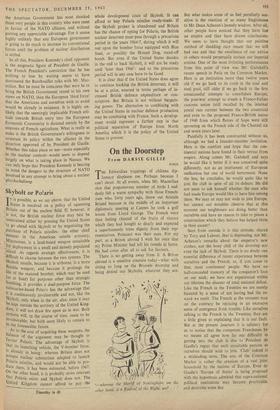Skybolt or Polaris
IT is possible, as we say above, that the United Britain is resolved on a policy of squeezing main out of the nuclear field. If, however, it is not, the British nuclear force may best be maintained either by pressing the United States to go ahead with Skybolt or by negotiating the ,Purchase of Polaris missiles: the other chief element in the American missile armoury, Minuteman, is a land-based weapon unsuitable
Timothy is ill
for deployment in a small and densely populated Island. As regards strategic effectiveness, it is difficult to choose between the two systems. The Skybolt missile, because it is airborne, is a more flexible weapon; and because it prolongs the life of the manned bomber, which may be used (as at Suez) for purposes other than strategic bombing, it provides a dual-purpose force. The submarine-based Polaris has the advantage that it is continuously invulnerable and not, like the Skybolt, only when in the air: also, since it may be kept outside the territory of the United King- dom, it will not draw fire upon us in war. Both systems will, in the course of time, cease to be invulnerable; but both seem likely to remain so in the foreseeable future. As to the cost of acquiring these weapons, the balance of the argument may be thought to favour Polaris. The advantage of Skybolt is that its launching vehicle, the V-bomber force, is already in being: whereas Britain does not possess nuclear submarines adapted to launch Polaris missiles, and would not be able to pro- duce them, it has been estimated, before 1967. On the other hand, it is probably more relevant that Polaris exists and Skybolt does not. The United Kingdom cannot afford to pay the
whole development costs of Skybolt. It can afford to buy Polaris missiles ready-made. If the Skybolt project is abandoned and Britain has the chance of opting for Polaris, the British nuclear deterrent must pass through a precarious period in the years 1964-7, during which it will rest upon the bomber force equipped with Blue Steel, or possibly the Hound Dog, stand-off bomb. But even if the United States decides in the end to back Skybolt, it will not be ready until 'later than 1966': and so the precarious period will in any case have to be faced.
It is clear that if the United States does agree to continue backing the British deterrent, it will be at a price, exacted in terms perhaps of in- creased British defence expenditure or con- scription. But Britain is not without bargain- ing power. The alternative to combining with the United States in nuclear defence production may be combining with France. Such a develop- ment would represent a further step in that political separation of Europe from North America which it is the policy of the United States to prevent.




























 Previous page
Previous page